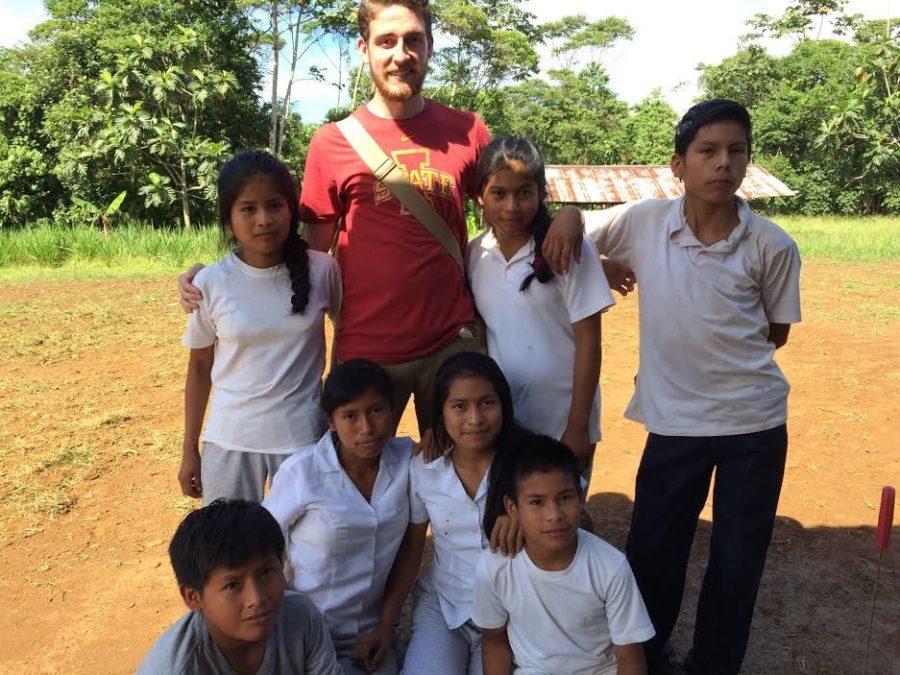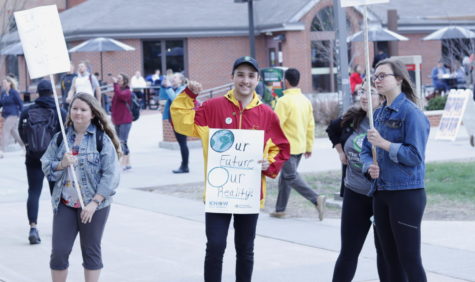ISU student finds adventure while pursuing dream internship
October 19, 2015
Living abroad can be scary for many students, but try living in a tree house in the middle of the Amazon Rainforest.
That is exactly what Sam Ennett, senior in global resource systems, did this summer.
Ennett is required to study abroad and have an internship for his major, but he said he didn’t want to do a normal internship; he wanted his experience to be unique.
“I wanted something that let me work with water filtration,” Ennett said.
So he turned to Google to start his search.
“I eventually found this website that allowed people to advertise internships and found a guy who was looking for exactly what I wanted to do,” Ennett said.
It just so happened that this internship was hosted in the Ecuadorian rainforest region — a region so isolated that it’s three hours from the nearest city.
Ennett’s internship host, Cesar Tucupi, is an Ecuadorian who lived with the indigenous people of the rainforest region and helped keep their village standing. Tucupi aided with repairs and any other tasks that were required and also hosted a number of non-government organization members who were there for work.
Once Ennett found the internship, he was hooked. He knew it was exactly what he was looking for.
It provided him with a unique experience and allowed him to study exactly what he wanted to. But what did his family think about him spending six weeks in the Amazon Rainforest?
“My parents were fine with it, for the most part,” Ennett said. “I studied abroad in Switzerland during my sophomore year, and [my parents] definitely fought that one more than this. I think they knew it was either I do this or I completely change my major.”
His grandparents, on the other hand, didn’t want him to go.
“They were convinced I was going to be attacked by some wild animal,” Ennett said.
Before traveling to Ecuador, Ennett had to take a survival course, where he researched the major religion of Ecuador, learned any hand gestures that wouldn’t be appropriate to use and had to locate the nearest hospital.
“This class prepared me for about 50 percent of the challenges I encountered in Ecuador,” Ennett said.
Ted MacDonald, professor of global research systems, said the survival course is meant to prepare students for possible situations they might run into and teach them to think on their own.
“We try to make sure our students can think through things so they aren’t surprised or overwhelmed when they visit a new country,” MacDonald said. “However, there is no substitute for actually putting your feet on the ground.”
Once Ennett had been accepted for the internship, he expected to hear from Tucupi, but didn’t receive an email until a week before he left. All the email said was that Tucupi would meet him at the bus stop in Macas.
“It was weird,” Ennett said. “I was going to a new country and all I really knew about my host was that he would meet me at a bus stop.”
Once Ennett reached Macas, he was in for a surprise.
“[Tucupi] told me we were going to go for a hike,” Ennett said. “That hike turned out to be a three-hour trek through the heart of the Amazon Rainforest. About halfway through we encountered a river [and Tucupi] told me to strip to my underwear so my clothes wouldn’t get wet. Once on the other side, he told me to just keep my clothes off for the rest of the hike.”
This was no ordinary hike either. Ennett said no marked path existed and the ground had turned into about four inches of mud.
Once Ennett reached the village of the Shuar, the indigenous community, and was able to get dressed, the Shuar hosted a meeting.
“I was sitting at this meeting listening to the Shuar speak, not understanding any of it because they were speaking Shuar,” Ennett said. “I knew they were talking about me though because I could pick out select Spanish words. They kept saying ‘American.’”
Ennett said the Shuar do not have words for things that were created after their language, like America, so they use the Spanish word when necessary.
“I asked [Tucupi] later what they were talking about, and it turns out they thought I was an oil worker,” Ennett said. “The Shuar don’t have the best relationship with oil workers. At the time, I didn’t feel scared or threatened, but when I look back, I realize that that could have been really bad.”
After the meeting, the Shuar hosted a dance party that lasted until 6 a.m., and then it was time for Ennett to get to work. He started off by visiting the river that he was going to be working on and had already decided before he left for Ecuador that he wanted to implement a greywater filtration system in the river.
“The problem with the river was that the Shuar used the river to bathe, drink and dispose of waste,” Ennett said. “With the filtration system in place, the river will be safer for them to drink.”
The only problem was the Shuar live in the middle of the rainforest, which is not the easiest place to transport material. So Ennett decided to do smaller tasks around the village while he waited for the materials to arrive.
“Despite all the planning students can do before going abroad, nothing ever goes perfectly,” MacDonald said. “We teach our students to take advantage of opportunities presented to them.”
Ennett said some of the tasks he helped with included digging trenches to stop the communal meeting place from flooding during heavy rains and teaching English to the Shuar children.
“The school teachers don’t speak English, so the students were learning English from only a textbook,” Ennett said. “ It was a luxury for the children to be taught English from a native speaker.”
Ennett finally got the supplies for the filtration system, but he ran out of time to build it. He instead had to translate the building instructions into Spanish, so Tucupi could build it later.
“It was disappointing, not being able to finish the work that I had gone to Ecuador to do,” Ennett said. “Even though I didn’t finish my work, it was an absolutely wonderful experience.”

















